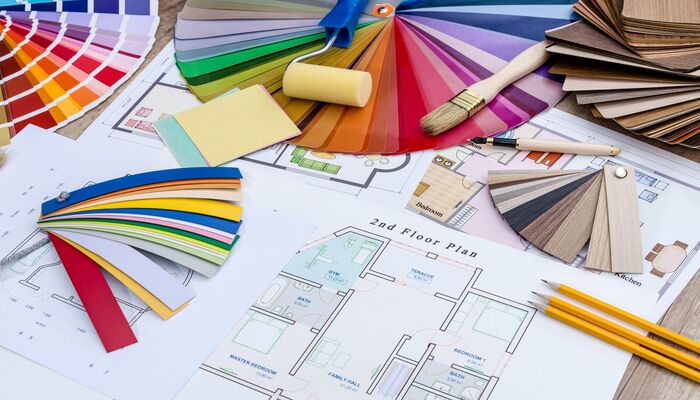Interior decorating is more than just arranging furniture and choosing paint colors; it’s about creating a space that feels uniquely yours. Whether you’re looking to refresh a single room or transform your entire home, the right techniques can make all the difference.
Good interior decorating goes beyond aesthetics—it’s about crafting an environment that reflects your personality and lifestyle. A well-decorated space can make everyday living more enjoyable and functional.
Ready to discover how you can elevate your home with a few smart tips? Keep reading to learn how easy it can be to turn your space into a stylish, inviting haven.
Why Interior Decorating is Important
Interior decorating is not just about choosing the right furniture or hanging a few pieces of art. It’s about creating an environment that feels like home—a place where you can relax, entertain, and even thrive.
In South Africa, where diverse cultures, natural beauty, and vibrant urban landscapes come together, the way you decorate your home can say a lot about you.
Having the right interior decorating skills can also increase the functionality of your space. It can turn a cluttered room into an organized sanctuary or transform a dull, outdated area into a modern, inviting space. When done well, interior decorating can elevate your quality of life and even add value to your property.
Start with a Plan: Understand Your Space
One of the most important interior decorating tips is to always start with a clear plan. Before you dive into purchasing new items or rearranging your current pieces, take the time to understand your space. This means assessing the size of the room, the natural lighting, and its primary function.
If you’re decorating a living room, consider how many people use the space regularly and for what purpose. Is it a place for relaxing, or do you entertain guests often? If it’s a bedroom, think about what makes you feel calm and relaxed.
South African homes often feature large windows that let in plenty of natural light, so you might want to play around with curtains or blinds that allow for easy adjustment of lighting.
Use Color Wisely
Color is one of the most powerful tools in interior decorating. It has the ability to influence the mood of a room, making it feel warmer, cooler, larger, or more intimate. In South Africa, you can draw inspiration from the natural landscape. Earthy tones like browns, greens, and terracotta can bring the outdoors inside, creating a sense of peace and serenity.
For smaller rooms, lighter shades of white, cream, or soft pastels can make the space feel larger. On the other hand, darker hues like navy blue or charcoal grey can add sophistication and a cozy feel. The key to interior decorating with color is balance. Use bold shades for accent walls or accessories, while keeping the majority of the space neutral.
Furniture: Function Meets Style
When it comes to choosing furniture, functionality should always come first. However, this doesn’t mean you have to sacrifice style. In South Africa, it’s common to see furniture made from sustainable materials, blending modern design with traditional craftsmanship.
Whether you choose wood, metal, or upholstered pieces, make sure they complement the overall aesthetic of the room.
For example, in an open-plan living area, a well-positioned sofa can serve as both a seating area and a divider between spaces. In smaller rooms, opt for furniture that is multi-functional, like a fold-out dining table or storage ottomans. This is a great way to maximize space while still creating a stylish and inviting atmosphere.
Lighting is Key in Interior Decorating
Proper lighting can transform any room, and it’s one of the easiest ways to enhance your interior decorating skills. South African homes often have access to natural sunlight, but artificial lighting is also crucial for setting the right mood. Consider using a combination of task lighting, ambient lighting, and accent lighting.
Task lighting, such as desk lamps or pendant lights over a kitchen island, helps with specific activities. Ambient lighting, like overhead lights or recessed lights, provides general illumination. Accent lighting, such as table lamps or floor lamps, creates a cozy, inviting atmosphere.
Incorporating warm, energy-efficient LED bulbs can help set the right tone without increasing your electricity bill. Additionally, in South Africa, many homes use skylights or large windows to maximize the benefits of natural light, giving the room a brighter, more open feel.
Add Personal Touches
No space is complete without a few personal touches. When you’re decorating your home, it’s important to include items that reflect your personality and style. Whether it’s a collection of family photos, unique artwork, or decorative items from your travels, these pieces help make the space feel truly yours.
One of the best aspects of interior decorating is the freedom to express yourself. Whether you prefer minimalist designs, bohemian styles, or traditional South African decor, your personal touch will make the space feel more inviting. Consider using local materials like woven baskets or hand-crafted furniture to bring authenticity into your home.
Make Use of Textures
Texture is an often-overlooked element of interior decorating that can add depth and interest to any room. Mixing textures, such as soft textiles with rough wood or smooth ceramics with chunky knit throws, can create a visually appealing contrast. Rugs, cushions, curtains, and throws are all great ways to add texture to a space.
South African homes often incorporate textures inspired by nature. Think woven linen, leather, or natural wood finishes that tie in with the country’s rich heritage and stunning landscapes. Playing with different textures can elevate the look of your home, making it feel more inviting and comfortable.
Experiment with Trends, But Stay True to Your Style
Interior decorating is a blend of creativity and personal style. While it’s tempting to follow the latest trends, it’s important to choose elements that truly reflect your taste. Popular trends in interior decorating often come and go, but timeless pieces can create a lasting impact.
If you love bold, contemporary designs, you can certainly experiment with them. However, don’t be afraid to mix in traditional South African pieces or vintage finds that resonate with you. The key to a successful interior decorating project is to strike the right balance between trends and timeless design.
Conclusion: Transform Your Space and Win
Mastering the art of interior decorating doesn’t require a degree in design—it’s about honing your creativity, paying attention to detail, and being open to experimentation. With the right mindset and a few essential tips, you can transform any space into a stylish, functional, and comfortable area that reflects your personality.
Whether you’re redesigning your home in Johannesburg, Cape Town, or any other part of South Africa, embracing the beauty of interior decorating can help you create the space of your dreams. With a bit of practice and an eye for design, you can transform your living environment and truly win the hearts of those who enter.





